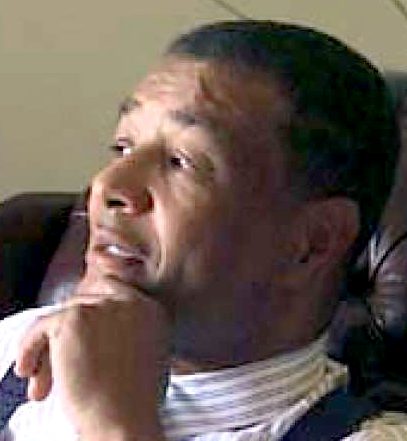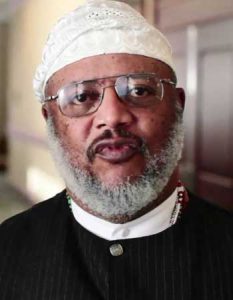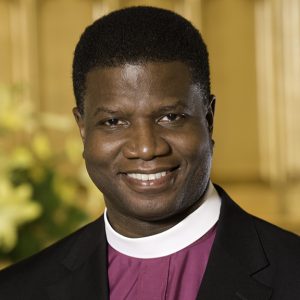Opinion
Opinion: Moral and Ethical Issues of Reparations

Summarizing the familiar patterns of some white people’s responses to racial discomfort as White Fragility has resonated for many people that responded to last week’s column.
The sensibility is so familiar because whereas our personal narratives vary, we are all swimming in the same racial water.

Dr. Wade Nobles
Dr. Wade Nobles, an Oakland psychologist, uses fish as a metaphor of the slave trade in which Western man is depicted as a saltwater fish and Eastern man (Africans) is a freshwater fish that is captured and forced to swim in an alien saltwater culture. The fish can swim but the salt irritates their sensibilities and reddens their eyes.
The salty water represents W.A.S.P/Individualism.
However, African Americans and all nonwhite folks are fresh-water fish whose vision has been irritated by the salt because they have been forced to adapt.
The Right Rev. Eugene Taylor Sutton, bishop of the Episcopal Diocese of Maryland, testified at Congresswoman Sheila Jackson Lee’s committee at the same hearing as filmmaker and seminarian Katrina Browne in June.
Sutton addressed the theological, political and economic complexity and intersectionality of the morality of reparations.
Sutton said Americans should avoid quick emotional responses to the word ‘reparations,’ because it could divide us and create resentment and suspicion.
He said just the term reparations accentuates the pains of the inherited mess of slavery that has long plagued this country.
There was an ominous judgment day tone to his words when he said, “None of us caused this brokenness, but all of us have a moral responsibility to fix it.

Bishop Sutton
“For generations the bodies of Black people did not belong to themselves but were bred, used and sold for the purpose of attaining wealth. Our nation prospered from that evil, and many of our institutions- including, sadly, the church, profited as well.
Sutton told Congress that moral leaders must be committed to repairing our “broken foundation.”
The economic and theological questions intersect, and Browne lived in a house on the corner of Seminary Avenue and Ill-Gotten Gain$ Boulevard (pun intended).
While theologians debate the moral issues of right and wrong and while they rhetorically ask, “What must I do to be saved?” I will focus on the economic, political and legal issues of reparations as I have for the past 30 years.
As the great writer Victor Hugo said, “Nothing is as powerful as an idea whose time has come.” The reparations issue is “woke,” and the time has come to examine the founding documents down the streets of government from Ms. Browne’s childhood lemonade stand.
While the whole world watches, my city of Oakland is again in the vanguard of the fight for justice and equity with its newly formed Department of Race and Equity. That new department is under the supervision of the city administrator and the mayor with the limitations of the budget and finances.
Oaktown, the seat of the Alameda County government, is the cultural hub of several ethnic and racial groups that seek the review and removal of some of the past actions of government and private cultural entities…
Unlike the early debates over the definition of “Black Power” in 1966, which often excluded whites, the reparations debate is open to all Americans.
Reparations is a struggle for the “Soul” of our beloved nation.
It is ‘all-hands-on-deck’ time.
It’s ‘repair the ship of state’ time.
Its reform and discard institutions time.
Let us think nationally but act locally to examine our local governments to find the hidden obstacles.
Activism
Oakland Post: Week of December 25 – 31, 2024
The printed Weekly Edition of the Oakland Post: Week of December 25 – 31, 2024

To enlarge your view of this issue, use the slider, magnifying glass icon or full page icon in the lower right corner of the browser window.
Activism
OPINION: “My Girl,” The Temptations, and Nikki Giovanni
Giovanni was probably one of the most famous young African American women in the 1960s, known for her fiery poetry. But even that description is tame. The New York Times obit headline practically buried her historical impact: “Nikki Giovanni, Poet Who Wrote of Black Joy, Dies at 81.” That doesn’t begin to touch the fire of Giovanni’s work through her lifetime.

By Emil Guillermo
The Temptations, the harmonizing, singing dancing man-group of your OG youth, were on “The Today Show,” earlier this week.
There were some new members, no David Ruffin. But Otis Williams, 83, was there still crooning and preening, leading the group’s 60th anniversary performance of “My Girl.”
When I first heard “My Girl,” I got it.
I was 9 and had a crush on Julie Satterfield, with the braided ponytails in my catechism class. Unfortunately, she did not become my girl.
But that song was always a special bridge in my life. In college, I was a member of a practically all-White, all-male club that mirrored the demographics at that university. At the parties, the song of choice was “My Girl.”
Which is odd, because the party was 98% men.
The organization is a little better now, with women, people of color and LGBTQ+, but back in the 70s, the Tempts music was the only thing that integrated that club.
POETRY’S “MY GIRL”
The song’s anniversary took me by surprise. But not as much as the death of Nikki Giovanni.
Giovanni was probably one of the most famous young African American women in the 1960s, known for her fiery poetry. But even that description is tame.
The New York Times obit headline practically buried her historical impact: “Nikki Giovanni, Poet Who Wrote of Black Joy, Dies at 81.”
That doesn’t begin to touch the fire of Giovanni’s work through her lifetime.
I’ll always see her as the Black female voice that broke through the silence of good enough. In 1968, when cities were burning all across America, Giovanni was the militant female voice of a revolution.
Her “The True Import of Present Dialogue: Black vs. Negro,” is the historical record of racial anger as literature from the opening lines.
It reads profane and violent, shockingly so then. These days, it may seem tamer than rap music.
But it’s jarring and pulls no punches. It protests Vietnam, and what Black men were asked to do for their country.
“We kill in Viet Nam,” she wrote. “We kill for UN & NATO & SEATO & US.”
Written in 1968, it was a poem that spoke to the militancy and activism of the times. And she explained herself in a follow up, “My Poem.”
“I am 25 years old, Black female poet,” she wrote referring to her earlier controversial poem. “If they kill me. It won’t stop the revolution.”
Giovanni wrote more poetry and children’s books. She taught at Rutgers, then later Virginia Tech where she followed her fellow professor who would become her spouse, Virginia C. Fowler.
Since Giovanni’s death, I’ve read through her poetry, from what made her famous, to her later poems that revealed her humanity and compassion for all of life.
In “Allowables,” she writes of finding a spider on a book, then killing it.
And she scared me
And I smashed her
I don’t think
I’m allowed
To kill something
Because I am
Frightened
For Giovanni, her soul was in her poetry, and the revolution was her evolution.
About the Author
Emil Guillermo is a journalist, commentator, and solo performer. Join him at www.patreon.com/emilamok
Activism
In addition to his work with the NAACP, Rick Callender is the Chief Executive Officer (CEO) of Valley Water in San Jose. In that role, he oversees an integrated water resources system with functions that include managing the supply of clean, safe water; instituting flood protections; and handling environmental stewardship of waterways for Santa Clara County’s 1.9 million residents.

By Edward Henderson, California Black Media
Rick L. Callender holds multiple influential roles. He is the President of the California/Hawaii State Conference of the NAACP (Cal-HI NAACP) and serves on the National NAACP Board of Directors.
Under his leadership, Cal-HI NAACP operates 74 branches and youth units across the state to push initiatives focused on racial justice and equality.
In addition to his work with the NAACP, Callender is the Chief Executive Officer (CEO) of Valley Water in San Jose. In that role, he oversees an integrated water resources system with functions that include managing the supply of clean, safe water; instituting flood protections; and handling environmental stewardship of waterways for Santa Clara County’s 1.9 million residents.
Recently, California Black Media (CBM) interviewed Callender. He reflected on the organization’s accomplishments, challenges they have faced, lessons learned this year, and goals moving forward.
Responses have been edited for length and clarity.
Looking back at 2024, what stands out to you as your most important achievement and why?
One of the things I’m most proud of is the support of policy changes related to the Ebony Alert, which went into place this year. That legislation ensured that Black girls and missing Black women would have their own alert. Often, when they go missing you don’t hear about it for weeks later.
How did your leadership and investments contribute to improving the lives of Black Californians?
It’s not my leadership, it’s the NAACP’s leadership. We’ve helped with legal consultations. Often, when you have something that occurs to you, some people can’t afford a legal consultation. We’ve cleared that hurdle for folks, so they don’t have to worry about the fee.
What frustrated you the most over the last year?
The pullback of a commitment to our community and the pullback from corporations on financing DEI initiatives, equity and civil rights. People have tried to make DEI sound like a salacious word. When you see these funds disappear, it’s because people erroneously think that they promote racism.
What inspired you the most over the last year?
The resilience and the determination of our youth. The youth have always led — not only the civil rights movement — but they have been the ones who will always be willing to step up.
It’s seeing a new Black leadership step up and being able to continue to fight.
What is one lesson you learned in 2024 that will inform your decision-making next year?
This is one thing: we can’t get distracted. We have to stay focused.
In one word, what is the biggest challenge Black Californians face?
Equity. Put anything in front of the word equity, and that’s what we face, from educational equity, criminal justice equity. Equity as it deals with economics. And just being able to make sure that we have the access to do what we need to do.
What is the goal you want to achieve most in 2025?
Staying focused on organizing around elections – and winning.
-

 Activism4 weeks ago
Activism4 weeks agoOakland Post: Week of November 27 – December 3, 2024
-

 Activism2 weeks ago
Activism2 weeks agoButler, Lee Celebrate Passage of Bill to Honor Congresswoman Shirley Chisholm with Congressional Gold Medal
-

 Activism2 weeks ago
Activism2 weeks agoPost News Group to Host Second Town Hall on Racism, Hate Crimes
-

 Activism2 weeks ago
Activism2 weeks agoDelta Sigma Theta Alumnae Chapters Host World AIDS Day Event
-

 Business2 weeks ago
Business2 weeks agoLandlords Are Using AI to Raise Rents — And California Cities Are Leading the Pushback
-

 Activism3 weeks ago
Activism3 weeks agoOakland Post: Week of December 4 – 10, 2024
-

 Arts and Culture1 week ago
Arts and Culture1 week agoPromise Marks Performs Songs of Etta James in One-Woman Show, “A Sunday Kind of Love” at the Black Repertory Theater in Berkeley
-

 Activism2 weeks ago
Activism2 weeks agoOakland Post: Week of December 11 – 17, 2024















































